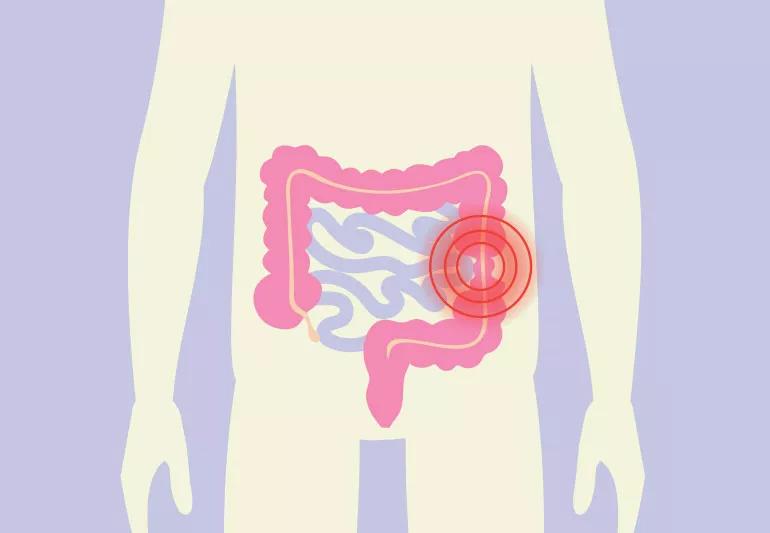Symptoms of IBS usually include abdominal pain, coupled with bloating and more

Some conditions can be hard to diagnose, especially if they have a wide range of symptoms that show up in different ways. Irritable bowel syndrome, or IBS, is one of those tricky conditions.
Advertisement
Cleveland Clinic is a non-profit academic medical center. Advertising on our site helps support our mission. We do not endorse non-Cleveland Clinic products or services. Policy
“Diagnosing IBS can be difficult because symptoms are the same as many other digestive diseases,” says gastroenterologist Brian Baggott, MD.
Because it’s difficult to diagnose, it’s important you see a trusted healthcare provider to get a correct diagnosis if you start showing signs and symptoms of IBS or other abdominal issues.
Dr. Baggott breaks down the symptoms of IBS you should watch out for. He also highlights symptoms that don’t point to IBS but may be a sign of a more serious condition.
IBS is generally associated with discomfort in your abdominal area. This can be triggered by stress or worsen after eating. A key sign that your symptoms indicate IBS: Your symptoms improve after going to the bathroom.
Signs of IBS include abdominal pain on average of one day a week over the course of three months.
As you already know (probably too well), belly pain can happen for any number of reasons, from food poisoning to an ulcer to kidney stones. Keeping track of what exactly you’re feeling — and what you were doing when the pain started — will help your provider narrow down the list of suspects.
People love to joke about having a “food baby” after a particularly hearty meal, but when bloating, cramping and gas get serious, they’re no laughing matter. In fact, trapped gas can cause chest pain so severe that people sometimes think they’re having a heart attack.
Advertisement
Everybody has their own “normal” when it comes to pooping, but as a general rule, you should be going somewhere between three times a week and three times a day.
If you suddenly find yourself going much more (or less) than usual, it’s a reason to talk to your provider. You also need to speak up if you’re experiencing greater urgency than usual, or are having accidents. Trust us: You’re not the only one.
It’s doesn’t make for great dinner conversation, but changes in the characteristics of your poop are worth discussing with your provider. If your stool has become watery or hard, or if you’re noticing clear or white mucous in the mix, it could be a sign that you have IBS.
There are three different types of IBS: IBS with constipation (IBS-C), IBS with diarrhea (IBS-D) and IBS with mixed bowel habits (IBS-M). The different types occur at roughly the same rate.
Keep in mind that you don’t have to have diarrhea and/or constipation all the time to have IBS. You just have to be experiencing these symptoms frequently over an extended period of time.
Of all the signs of IBS we’ve listed here, this one tends to surprise people the most. But it probably shouldn’t. We know that our brain and our gut are deeply interconnected. And we’ve all experienced nervous poops and stress nausea from time to time.
It makes sense, but we don’t yet know the exact nature of the relationship between anxiety disorders, mood disorders and IBS. Does our mental health dictate our gut health, or vice versa? After all, IBS can be stressful, especially when you’re in an environment you can’t control.
To make matters more confusing, some medications for anxiety and depression can help calm IBS symptoms, while others can make them worse. Add that to the pile of reasons to see your healthcare provider for a formal diagnosis.
Many people with IBS are able to point to certain foods that trigger a flare. The most common offenders fall into the FODMAP category: fermentable oligosaccharides, disaccharides, monosaccharides and polyols.
Say that five times fast!
FODMAPS are carbohydrates that are difficult to digest. Specifically, we’re talking about fructose, lactose, fructans, galactans and polyols.
It’s not uncommon for people to have an intolerance to some or all of these carbohydrates. For example, research suggests as many as 70% of us become lactose intolerant as we age. In other words, having an intolerance doesn’t mean you have IBS, but it’s often the case that people with IBS happen to have food intolerances, too.
Advertisement
Many people with IBS follow a low FODMAP diet to manage their symptoms. If you aren’t sure if you have a food intolerance (as opposed to an allergy), keeping a journal of your symptoms might help. More on that later.
Are you sick and tired of feeling sick and tired? Do you ever notice that your gastrointestinal symptoms are worse when you’ve had a bad night’s sleep?
While we don’t fully understand why yet, studies suggest that over 50% of people living with IBS experience fatigue and sleep issues. It’s a vicious cycle: Poor quality sleep leads to a flare, which leads to poor quality sleep.
“IBS is a real disease that has real treatments that can significantly improve your quality of life,” says Dr. Baggott. That’s why it’s important to monitor your symptoms and see a healthcare provider for evaluation.
While you wait for an appointment, keeping a symptom journal can help speed up the diagnostic process.
Not only can keeping a symptom journal help your provider determine if you’re experiencing IBS, but it can also help you identify your specific triggers. All you have to do is write down the following:
Advertisement
Even if you don’t end up being diagnosed with IBS, a symptom journal can give you crucial insight into how and why you aren’t feeling well.
While it’s important to identify the symptoms you’re experiencing, it’s also important that you don’t rely on self-diagnosis. It’s important to see a healthcare provider because it’s possible you have another digestive disease.
Even if you do have IBS, there are a lot of ways to manage the condition and treat flare-ups. Only a healthcare provider will be able to tell you what makes the most sense for your situation. They might recommend adjusting your diet, switching off medications that are common IBS triggers, getting prescriptions for antispasmodics, or making dietary and lifestyle changes to promote exercise and manage stress. And that’s just the tip of the IBS-management iceberg!
Chalking your symptoms up to IBS — and not consulting with a healthcare provider — could be a dangerous mistake. That’s because abdominal pain, changes in bowel movement and stool changes can be associated with a variety of conditions, including the following:
Advertisement
Some common symptoms that aren’t associated with IBS include:
If you experience significant bleeding or sudden weight loss, you need to see a healthcare provider immediately.
“If your history raises red flags like bleeding or weight loss, you have to really act on that and not assume it’s IBS,” cautions Dr. Baggott.
IBS is associated with a wide range of symptoms, including abdominal pain, constipation, and diarrhea.
If you’ve been experiencing symptoms of IBS consistently over the course of three months, you should seek out a diagnosis from a healthcare provider. There are a number of different ways to treat IBS, and they’ll be able to review the options with you.
If you notice sudden weight loss or bleeding, you probably aren’t experiencing IBS. These symptoms can be a sign of a severe gastrointestinal issue, so you should also make an appointment with a provider as soon as possible.
Learn more about our editorial process.
Advertisement

A low-FODMAP diet or gluten-free diet could help you manage your symptoms, but only with professional guidance

Triggers can range from the foods you eat and the medications you take to how often you exercise and how stressed you are

Changes in eating, exercise and sleep habits often can help reduce symptoms

Pediatric IBS treatment involves making dietary adjustments, getting mental health support and — in some cases — taking prescription medication

You don’t have to limit travel with proper planning

The caffeine and natural acids in coffee may trigger acid reflux, but there are ways to lessen the effects

Wait a few hours, then start with water or ice chips, graduating to clear liquids and then, soft, bland foods

Eating a healthy diet, reducing stress, and focusing on exercise and sleep can help keep your digestive system in top form

Wearing a scarf, adjusting your outdoor activities and following your asthma treatment plan can help limit breathing problems

Your diet in the weeks, days and hours ahead of your race can power you to the finish line

When someone guilt trips you, they’re using emotionally manipulative behavior to try to get you to act a certain way